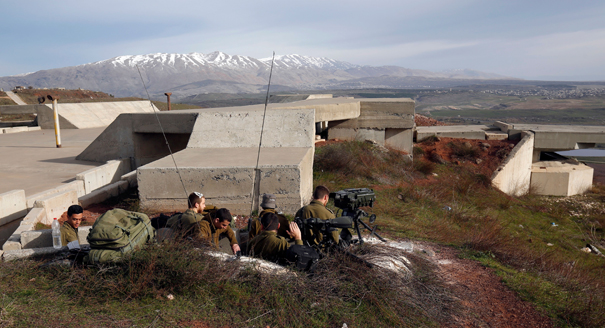Hazem Saghieh | Writer and senior columnist at the Al-Hayat newspaper
Inevitable? Not so sure. I would rather say highly probable. What we are facing in the Middle East today are two irreconcilable attitudes: First, an adamant Israeli stance that no Iranian military presence is allowed in Syria. For Israel, such a presence is akin to a threat to its national security. And second, Iran’s insistence on reaping the fruits of what Tehran and its proxies invested in Syria. Israel’s strategy, in this regard, is conservative, in the sense that it wants to preserve the status quo in the region. Iran’s is revolutionary, aiming at dismantling the status quo and the pillar on which it rests, namely the nation state system.
The Iranian endeavor to link Tehran to Beirut, and maybe to Gaza, through Iraq and Syria, amounts to changing the “nature” of the region on almost all levels. This radical engineering represents a dramatic and dangerous turning point. Furthermore, the nature of both the Israeli and Iranian regimes is not reassuring to peace-loving people. One is semi-totalitarian and the other is hypernationalistic. Both countries are expansionist. With Lebanon caught in the middle of this, we have nothing for which to be envied.
Jean-Pierre Filiu | Professor of Middle East studies at Sciences Po, Paris School of International Affairs. Author of The Arab Revolution: Ten Lessons From the Democratic Uprising (2011), Gaza: A History (2014) and From Deep State to Islamic State: The Arab Counter-Revolution and its Jihadi Legacy (2015)
Historians like me are much better at looking at the past than predicting the future, but I do not see a full-fledged war between Iran and Israel in the making in Syria. Israeli Prime Minister Benjamin Netanyahu is painfully adjusting to the fact that his short-sighted policy of considering the Assad regime as the “lesser evil,” and even a rampart for stability, has only brought Iran’s might closer than ever to his own country. The recent clashes between Israel and Iran in Syria revealed the difficulty for both sides to deal with such an unprecedented situation, but I tend to think that they will eventually lead not to further escalation, but to the consolidation of new “red lines” tacitly endorsed by Israel and Iran.
Netanyahu believed Russian President Vladimir Putin could deliver Iranian restraint and was shamefully proven wrong. But Teheran has absolutely no interest now in an open conflict with Israel that could jeopardize its formidable gains in Syria. I am therefore confident that a de facto agreement will coalesce in the short term, with the Syrian people paying once more the price of this devious “de-escalation.”
Nicholas Noe | Co-founder of the Beirut-based Mideastwire.com.
A devastating war that might start in Syria and at least involve Israel, Iran, Syrian President Bashar al-Assad’s forces, and Hezbollah has been building for decades and is now, unfortunately, very likely. It is certainly not inevitable, however.
Indeed, though the Trump administration could have delayed withdrawal from the nuclear deal with Iran, helping to reduce the immediate likelihood of conflict with Iran, there are other things that it can still do to reduce that possibility. It can delay moving the U.S. embassy to Jerusalem, and it can work to simultaneously reassure Israel and reign in its very public and deliberate march to a “preemptive” war over its “red lines” in Syria.
In parallel to this, the U.S. administration might also urgently engage Russia and encourage Moscow to use these attractive “carrots” to both prevent further “responses” by Iran to Israel’s strikes on its positions in Syria last month, and then to hammer out a new map for Syria that constrains Iranian and Hezbollah military infrastructure there, ideally within a reinvigorated Russian and U.S.-led effort to cease hostilities across the country.
The essential problem in all of this is that the United States, which is best positioned to at least probe whether such a conflict-mitigation process might bear fruit, is ruled—in the majority now—by individuals who possess neither the ability nor the desire to effectively manage such an immensely difficult task.
The dynamics lubricating our rapid descent into war—one that I believe might start in Syria, but will inexorably spread to the depths of Lebanon and Israel (and quite likely to Iran itself)—could be stymied. However, the sad reality is that not the United States, Russia, or any other combination of powerful global actors appear ready, willing, and able to do so.
Nicholas Blanford | Beirut correspondent of the Christian Science Monitor and nonresident senior fellow in the Middle East Peace and Security Initiative at the Atlantic Council’s Brent Scowcroft Center on International Security. Author of Warriors of God: Inside Hezbollah’s Thirty-Year Struggle Against Israel (2011)
At some point, as it did yesterday, Iran had to undertake a more forceful response to repeated Israeli airstrikes against its assets in Syria, in order to maintain a semblance of deterrence. So we could easily see an escalation between Israel and Iran on Syrian territory. But I think it’s in the interests of all parties to keep Lebanon out of any flare-up, even if Hezbollah is assisting Iran from Syria. If Hezbollah is activated to participate from Lebanon, the scale of conflict will increase dramatically and will prove enormously destructive for both Lebanon and Israel. The risk, however, is that if conflict escalates between Israel and Iran in Syria, the Israelis might assess at some point that Hezbollah is about to open the Lebanon front. Israel might surmise that it is better to strike Hezbollah in Lebanon first before guided missiles are launched at Tel Aviv. The same rationale applies to the other side, with Iran deciding that Hezbollah should launch its missiles to deny Israel a first-strike option. In short, a conflict between Israel and Iran in Syria is more than possible, and while both sides will attempt to keep it manageable and limited geographically, the risk that it will reach Lebanon is very real.








